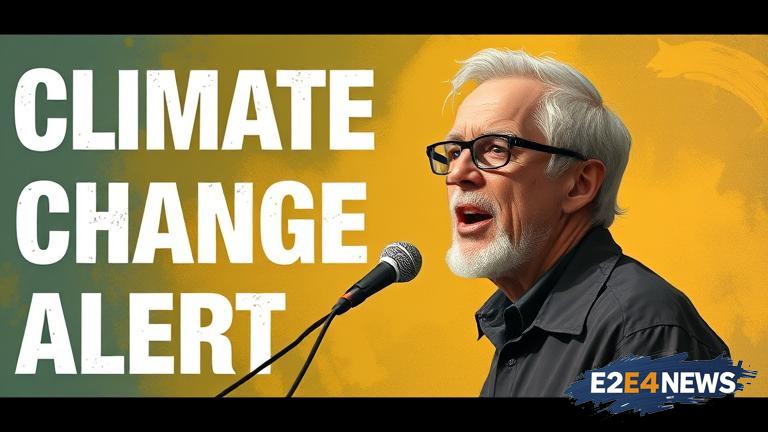Bill McKibben, a prominent environmentalist and author, has been a vocal advocate for climate change awareness and action for over three decades. In his numerous writings and public appearances, McKibben has consistently emphasized the gravity of the climate crisis and the need for immediate, collective action to reduce greenhouse gas emissions and transition to renewable energy sources. The science is clear: human activities, particularly the burning of fossil fuels and deforestation, are releasing massive amounts of carbon dioxide and other greenhouse gases into the atmosphere, leading to a global average temperature increase of over 1°C since the late 19th century. This warming is causing melting of polar ice caps, sea-level rise, and altered weather patterns, resulting in more frequent and severe heatwaves, droughts, and storms. McKibben argues that the window for action is rapidly closing, and that the next decade will be crucial in determining the course of human history. He emphasizes that the climate crisis is not just an environmental issue, but also a social justice and economic one, as the poorest and most vulnerable communities are often the most affected by climate-related disasters. The fossil fuel industry, McKibben contends, has been aware of the climate risks associated with their products for decades, but has engaged in a deliberate campaign of disinformation and obstruction to block meaningful action. Meanwhile, the cost of renewable energy is plummeting, making it more competitive with fossil fuels than ever before. McKibben calls for a rapid transition to 100% renewable energy, as well as a halt to all new fossil fuel infrastructure projects. He also advocates for a global climate treaty that would establish binding emissions reductions targets and provide financial support to developing countries to help them transition to a low-carbon economy. The climate movement, McKibben believes, must become more diverse, inclusive, and militant, using nonviolent direct action and other forms of protest to push for policy changes. He also emphasizes the importance of individual actions, such as reducing meat consumption, using public transport, and insulating homes, but stresses that these efforts must be accompanied by systemic changes in policy and infrastructure. The climate crisis, McKibben warns, is not just a technical problem, but also a moral and spiritual one, requiring a fundamental transformation of our values and way of life. He draws inspiration from social movements of the past, such as the civil rights movement and the anti-apartheid movement, which demonstrate the power of collective action to bring about significant social change. McKibben’s message is not one of despair, but of hope and urgency, emphasizing that the climate crisis can still be solved, but only if we act quickly and decisively. The fate of human civilization, he argues, depends on our ability to come together and take bold action to reduce our carbon footprint and protect the planet. The clock is ticking, and the time for denial, delay, and excuses is over. We must, McKibben urges, rise to the challenge of the climate crisis and create a more just, equitable, and sustainable world for all. The alternative, he warns, is a future of devastating climate-related disasters, social unrest, and economic collapse. The choice is ours, and the time for action is now. McKibben’s work has been widely praised for its clarity, urgency, and moral passion, and has inspired a generation of climate activists and advocates. His writing has been translated into numerous languages and has appeared in publications around the world. McKibben has also been a frequent guest on television and radio programs, and has spoken at conferences and rallies on every continent. Through his work, McKibben has helped to build a global climate movement that is more diverse, more militant, and more effective than ever before. The climate crisis, McKibben argues, is a wake-up call for humanity, a chance to re-examine our values and our way of life, and to create a more just and sustainable world for all. We must, he urges, seize this moment, and work together to build a better future, before it’s too late.





